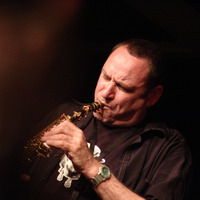Search
Rychard Carrington reports on Gilad Atzmon – The Junction, Cambridge, 15 January 2010

I've seen jazz saxophonist Gilad Atzmon twice before: guesting with the excellent Nick Hill Quartet at The Cricketers two years ago, and playing as a member of The Blockheads at The Junction last year. Both performances (but especially the former) gave me an impression of his prowess and enthusiasm as a performer, yet only in his own show does his strongly individual personality come into its own. Throughout the evening Gilad would frequently abandon his microphone and play with his feet balanced on the edge of the stage. An edgy performer, verily.
Edgy and consummate may rarely go together, but tonight they did. This was top quality jazz: smooth and cool in places, intense and hot in others. Gilad was performing with regular partners The Orint House Ensemble (Frank Harrison, piano; Yaron Stavi, double bass; Eddie Hick, drums ) and also The Sigamos String Quartet. The set was inspired by Charlie Parker's Bird With Strings album, but, as Gilad acknowledged,there was too little Parker and too much Atzmon for it to really qualify as a tribute evening. The rare combination of strings with jazz definitely worked well, adding an extra texture which blended in most productively.
Gilad is qute well known for his intense hostiluy to ther politics of the state of Israel, in which he was brought up. He has written quite extensively about this, and made a lot of enemies through his support of Palestinian militancy. But anyone expecting an earnest intellectual or a humourless zealot would have been quite surprised; ther were acouple of reference to Palestinian politics: Gilad declared 'My name is Jihad. ... I am serious.' one wasn't sure how to respond. See what I mean about edgy? But the man was full of slightly bizarre humour, as when he described Louis Armstrong as Palestinian, and Charlie Parker as having been born in Hartlepool. The humour got more questionable with his overtly anti-fenminist attitude to sex. No one objected, but how did the women in the audience, not to mention the ones in the Sigamos String Quartet, really feel about this, I wonder? It's an indicative cultiral change: surely no leftwing jazz musician would have made such comments in the eighties? As often with political disapproval, though, it is best to situate any judgements within an appreciation of the overall character of the speaker and the situation, and, overall, Gilad comes across as very evidently a warm-hearted and passionate man. When he expresses himself through his jazz, one envies such a master's affinity with his musical language. Never mind politics, never mind sex, with such music emotional expression all comes right. It's something we human beings can do very well. And if we can't perform ourselves, we can at least listen and savour. Great stuff!
Writer: Rychard Carrington